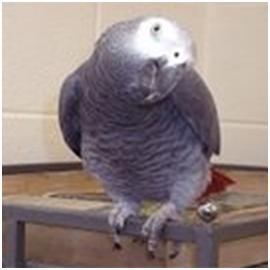 If there ever was a moment to pause before making a decision about which path to take when it comes to the animals in your home, getting a bird is one of those moments. They are so beautiful and it seems so simple – just put them in a cage and feed each day, right? Well, not exactly. What most people don’t realize is that day to day life with a bird – big or small – can be difficult. They are demanding flock creatures whose desire for round the clock attention and activity is insatiable. They are also really smart. In fact, Dr. Irene Pepperberg who has run a 30+ year seminal study of avian intelligence through the Alex Foundation, has shown us that they have the intellectual capacity of a 5-6 year old human child and the emotional capacity of a 2 year old human child. Still thinking you can have a happy bird who spends all his time in a cage? Many people are accustomed to seeing smaller birds in cages and think this is a suitable life for a curious, intelligent, feeling creature. As a result, they don’t realize the trouble the bird is having with life alone in a cage with no stimulation. Bigger birds often let you know how they feel by screaming, developing unusual behaviors or plucking out their feathers.
If there ever was a moment to pause before making a decision about which path to take when it comes to the animals in your home, getting a bird is one of those moments. They are so beautiful and it seems so simple – just put them in a cage and feed each day, right? Well, not exactly. What most people don’t realize is that day to day life with a bird – big or small – can be difficult. They are demanding flock creatures whose desire for round the clock attention and activity is insatiable. They are also really smart. In fact, Dr. Irene Pepperberg who has run a 30+ year seminal study of avian intelligence through the Alex Foundation, has shown us that they have the intellectual capacity of a 5-6 year old human child and the emotional capacity of a 2 year old human child. Still thinking you can have a happy bird who spends all his time in a cage? Many people are accustomed to seeing smaller birds in cages and think this is a suitable life for a curious, intelligent, feeling creature. As a result, they don’t realize the trouble the bird is having with life alone in a cage with no stimulation. Bigger birds often let you know how they feel by screaming, developing unusual behaviors or plucking out their feathers.
There was a very insightful piece on CBS Sunday Morning this week entitled Bye Bye Birdie about the aftermath of bird “ownership” which shows rescue centers overloaded with birds cast off because they were too loud, too demanding, too difficult, too destructive. I highly recommend visiting both the Alex Foundation site to find out more about exotic birds as pets as well as watching this CBS piece before making the decision to live with birds of any size. Exotic birds (little birds like parakeets included) are amazing curious creatures and ones whose intellectual and emotional capacities run so deep and who are so needy that it can be overwhelming.
I recently was at a lunch with some friends and one of the women asked if there was anyone we knew who could take in a 20 year old Cockatoo. The bird had been with her owner for all those years and one day ripped into the woman’s face – a violent act she had never even hinted at before. The vet told her to “get rid of the bird” which begs the question of what to do with her? She would live another 40-50 years and had bonded to this one woman who was her mate. Could it be more appropriate to find out what caused the outburst, addressing the problem and finding a way to keep the bird in the same home? This particular situation is not unique. Birds (and other animals) may live for years in a situation they find frustrating only to finally reach the “end of the rope” and lash out. The “owner” sees it as aberrant violent behavior. But, the animal generally has been sending out clues about their unhappiness for a long time – clues the person never understood or picked up on.
I have had the pleasure of living with small exotic birds for 20 years and can attest to the fact that it is a full time position. Fortunately I have worked at home for all the time we had birds. I am not sure what I would have done if I had to work outside the house, as the need for attention and companionship by birds surpasses anything I have ever known with other animals – even dogs. Birds are brilliant in mind and body and can be pretty mysterious. A good human companion to a bird is one who is prepared for a lifelong commitment to an unusual and complicated lifestyle. The cost can be very high to bird and human if it’s the wrong match. And apart from the ethics of “getting rid of the bird”, as indicated in this CBS piece, placing the bird somewhere else is not always an option. The best way to avoid these sad stories is to not take in a bird until you are absolutely certain you are prepared for it. And, if you are ready, then adopting one or two of the many birds already in need may be a good option for all of you.
Photo courtesy of The Alex Foundation